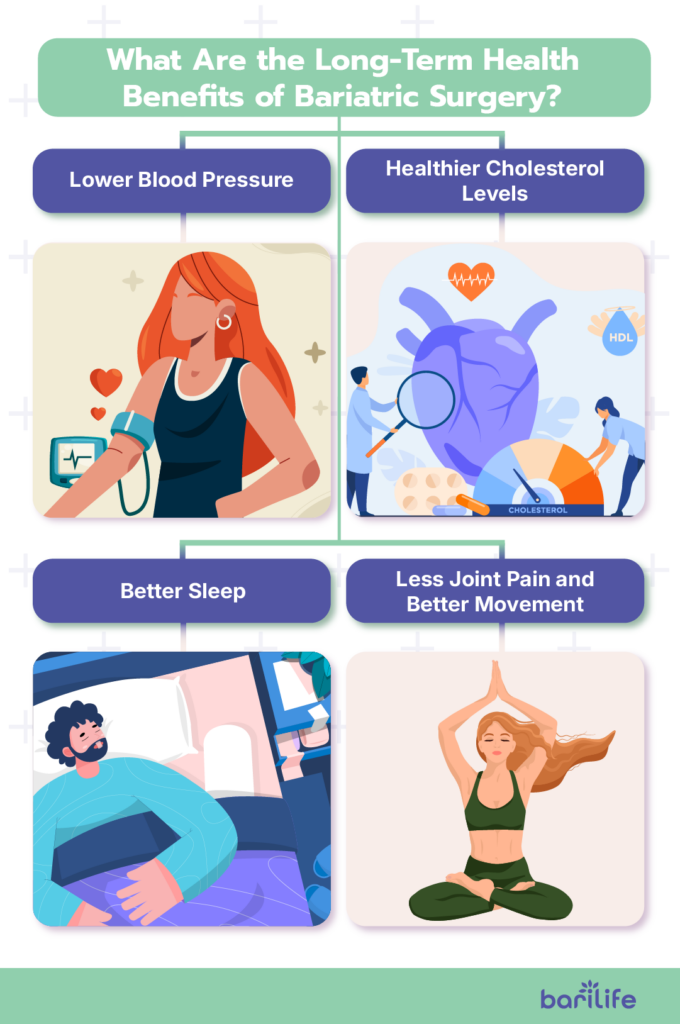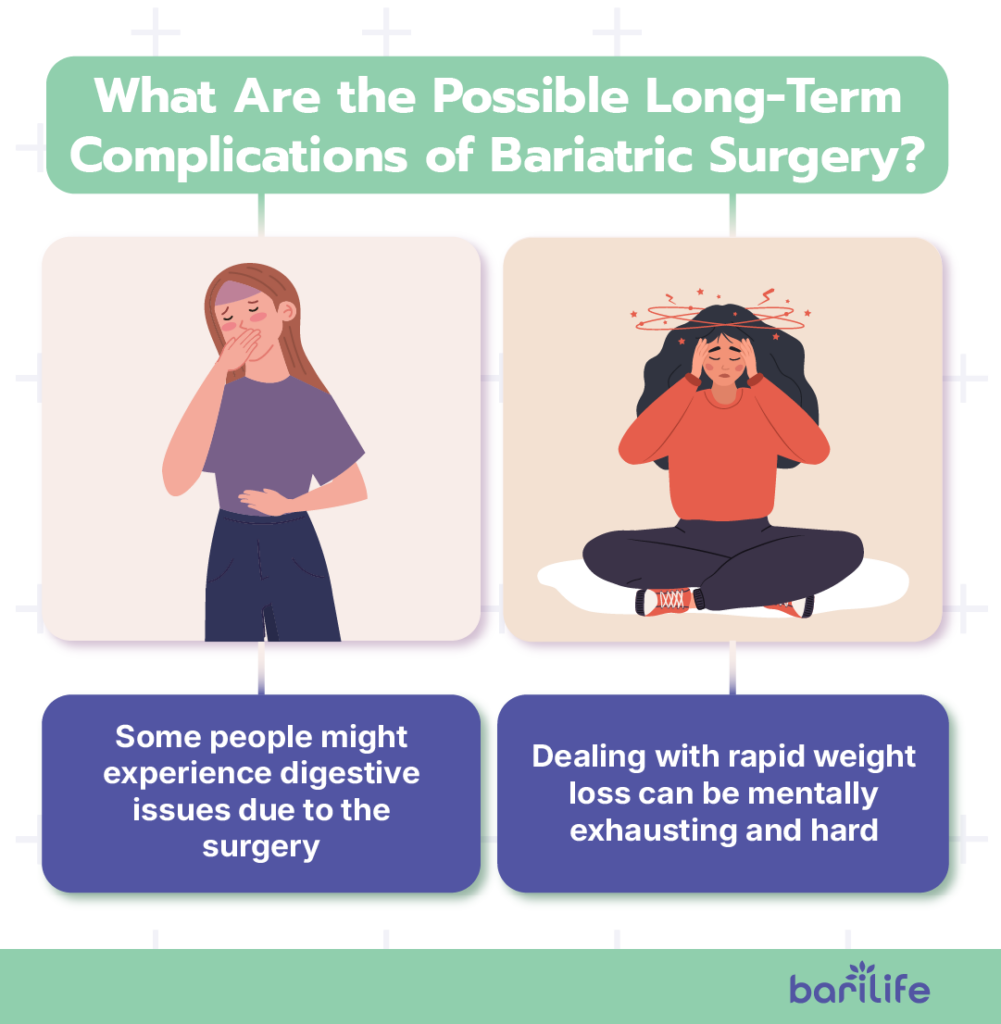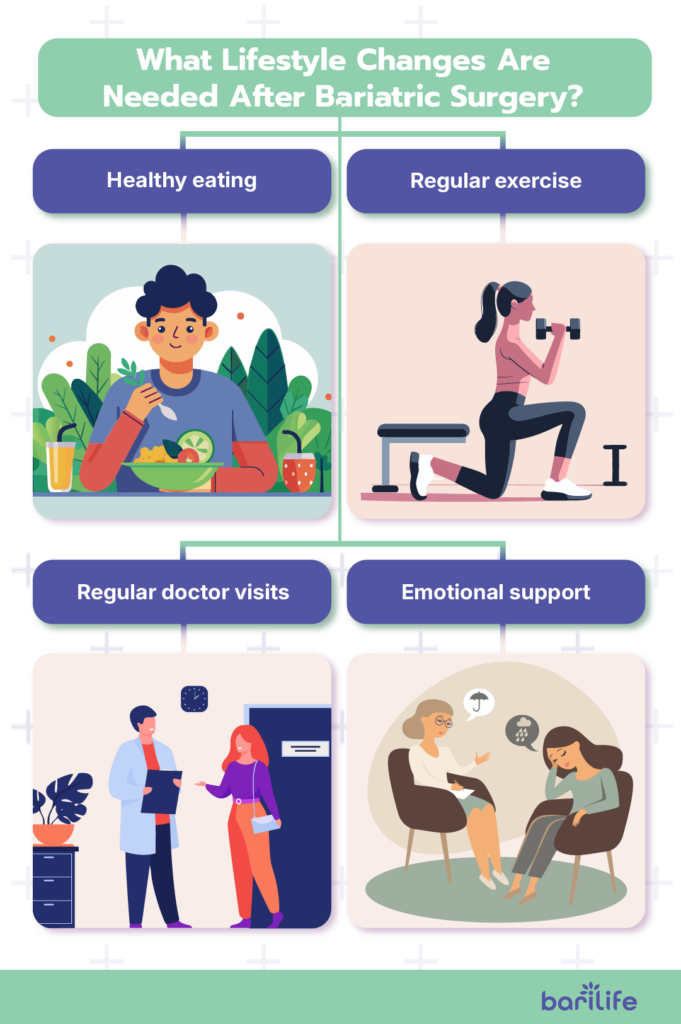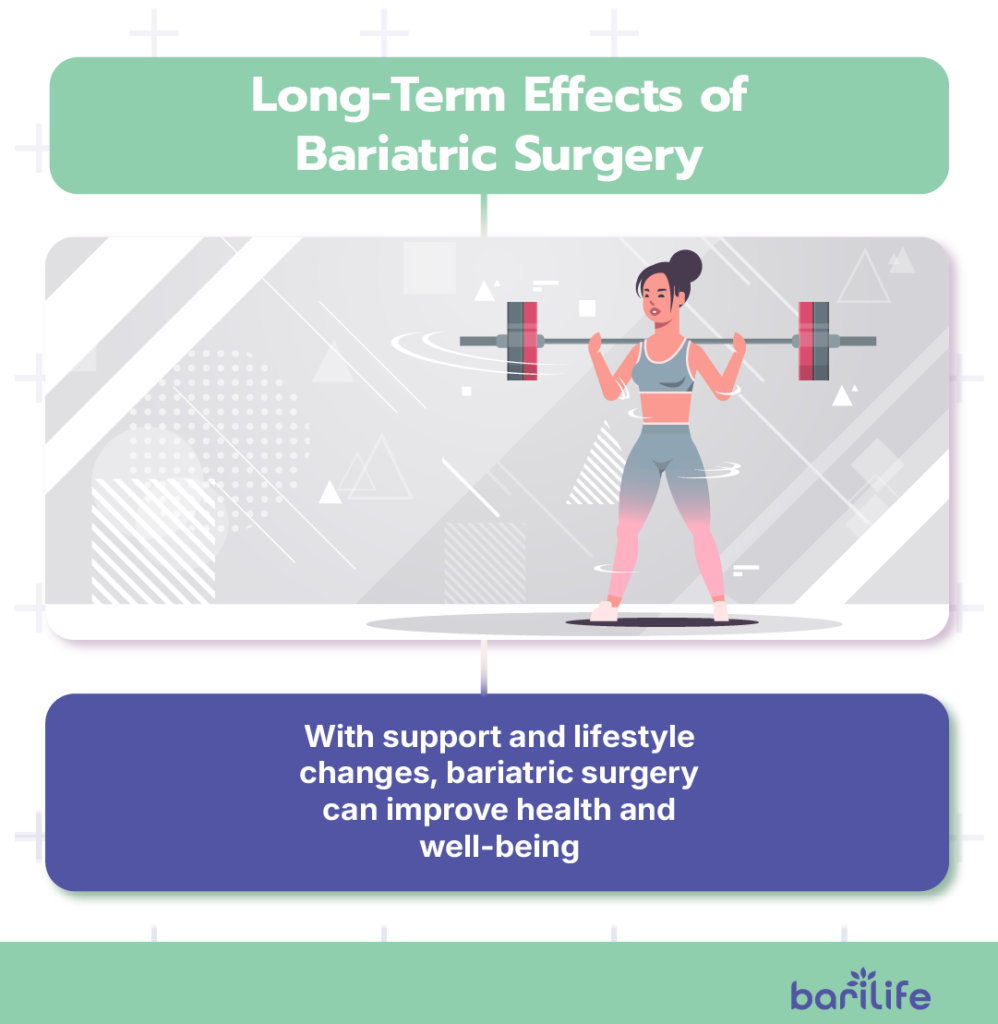Losing weight after bariatric surgery may help you better control conditions related to having excess weight. You may see improvements in your blood sugar, heart health, sleep, and have less joint pain.
However, it’s possible to also experience some long-term complications, such as nutritional deficiencies, surgical complications, digestive problems, and mental health challenges.
To help you make an educated decision about bariatric surgery, we’ve put together this article that explores the long-term effects of bariatric surgery.
[/box]
What is Bariatric Surgery, and What Are Its Long-Term Goals?

Bariatric surgery is a medical procedure that helps people with obesity. The surgery changes the size or function of the stomach and sometimes alters the intestines to decrease calorie and nutrient absorption. If you're wondering how does bariatric surgery work, it involves either restricting food intake or reducing absorption—or both.
However, bariatric surgery is not just about losing weight quickly—it has long-term goals that can improve your health and quality of life. Let’s explore these goals in more detail.
Helping People Lose Weight and Keep It Off
We get it, losing weight can be difficult. Maybe you’ve tried methods such as dieting, increasing exercise, or taking medications.
If you’ve tried to lose weight through various methods and have not succeeded, bariatric surgery may be the key to helping you achieve your weight goals.
Incorporating bariatric vitamins as part of your post-surgery regimen can be crucial in meeting your health needs and maintaining weight loss.
Improving Health Conditions Caused by Obesity
Having excess weight puts you at risk for serious health conditions that affect your long-term health. Bariatric surgery can help reduce or even correct these conditions.
Some specific health disorders bariatric surgery may affect include:
- Type 2 diabetes: You may experience significant improvements in your blood sugar levels after surgery or even reduce or eliminate the need for medication.
- High blood pressure: Bariatric surgery can help lower your blood pressure, which reduces the risk of heart attack and stroke.
- Sleep apnea: After surgery, you may experience improvements in your sleep apnea, although outcomes can vary.
Including bariatric protein shakes in your diet can also help stabilize blood sugar levels and support your overall health.
Improving Quality of Life
Excess weight can make everyday activities more challenging, like walking, climbing stairs, or playing with kids. It can also affect your mood and confidence.
Bariatric surgery may help you feel more energetic, boost your self-esteem, and improve your overall happiness. Supporting these changes with bariatric multivitamins ensures your body gets essential nutrients during this transition.
What Are the Long-Term Health Benefits of Bariatric Surgery?
Bariatric surgery aims to support better health and quality of life, with potential benefits like increased energy and reduced health risks. Here are some of the most important long-term benefits of bariatric surgery.

Better Control or Cure of Type 2 Diabetes
After bariatric surgery, you may notice a significant improvement in your blood sugar levels. In some cases, diabetes goes into remission, but this is not the case with everyone. This means you might not need to take insulin or other diabetes medicines anymore.
Lower Blood Pressure
If you are struggling with high blood pressure, you may experience a reduction in your blood pressure after surgery. Having your blood pressure remain in a healthy range reduces your risk of dangerous conditions, such as heart attack, stroke, and kidney disease.
Healthier Cholesterol Levels
Bariatric surgery may improve your cholesterol and triglyceride levels. Cholesterol and triglycerides are fats in your blood that can lead to heart disease.
Better Sleep
If you have sleep apnea, you may notice an improvement in your sleep after bariatric surgery.
Sleep apnea is a common problem for people with excess weight. It causes snoring, poor sleep, and tiredness during the day.
After bariatric surgery, you may sleep better and feel more rested.
Less Joint Pain and Better Movement
Having excess weight puts a lot of stress on your knees, hips, and other joints. After losing significant weight, you may feel less pain and move more easily.
This makes enjoying activities like walking, dancing, or playing sports easier.
What Are the Possible Long-Term Complications of Bariatric Surgery?
While bariatric surgery has many benefits, it’s important to know that there are some risks and potential challenges, too. These include:
Nutrient Deficiencies
After surgery, some people don’t get enough vitamins and minerals because their stomach is smaller or their intestines absorb less food. This can lead to problems like:
- Weak bones
- Hair loss
- Fatigue
To avoid this, healthcare providers often recommend taking vitamin and mineral supplements for the rest of their lives.

Digestive Problems
Some people may experience digestive issues after bariatric surgery like:
- Nausea or vomiting
- Diarrhea
- Trouble digesting certain foods
You may be able to manage these problems by eating smaller meals and avoiding processed and difficult-to-digest foods.
Surgical Complications
Like any surgery, bariatric surgery comes with some risks.
These may include:
- Hernias
- Bowel obstructions
- Infection
- Bleeding
- Acid reflux
- Leaking at the surgical site
While these complications are relatively uncommon, they may require additional medical treatment if they occur.
Mental Health Challenges
Losing a lot of weight quickly can sometimes be hard emotionally. You may feel stressed or anxious about how your body looks after surgery.
Or, you may struggle with returning to negative eating habits.
Getting support from counselors, registered dietitians, or support groups may help with these challenges.
How Does Bariatric Surgery Affect Mental Health?
Bariatric surgery can have a big impact on mental health. These effects can be both positive and challenging.
Positive Changes
Here are some positive changes you may experience:
- More confidence: You may feel happier with how you look and feel after losing weight. You may also feel more comfortable in social situations or trying new things.
- Less anxiety and depression: Obesity is often linked to feelings of sadness or worry. Losing weight can help improve your mood and mental well-being.
Challenges to Watch For
Here are some challenges you may face:
- Body image issues: Even after losing weight, you may not feel happy with your appearance. You may struggle with loose skin or feel self-conscious about your body.
- Emotional adjustments: Rapid physical changes can be overwhelming. It can take time for you to get used to a new way of eating, moving, and living.
What Lifestyle Changes Are Needed After Bariatric Surgery?
Bariatric surgery is not a quick fix—it’s the start of a new lifestyle. To keep the weight off and stay healthy, you’ll need to make some changes in your daily habits.

These lifestyle changes include:
- Healthy eating: Focus on eating smaller meals that are rich in nutrients, such as fruits, vegetables, lean proteins, and whole grains. It’s also important to avoid processed, sugary, and fatty foods.
- Regular exercise: Exercise is key to maintaining a healthy weight after surgery. Activities like walking, swimming, or yoga are great options.
- Regular doctor visits: After surgery, you’ll need to see your healthcare provider regularly. These check-ups help catch any problems early and ensure you are getting enough nutrients.
- Emotional support: Joining a support group or talking to a counselor can help you handle the emotional changes that come with significant weight loss. Support from family and friends is also important.
Does Bariatric Surgery Help People Live Longer?
Some research suggests that bariatric surgery may contribute to a longer lifespan, particularly when maintaining the recommended lifestyle changes.
People who were once at risk of serious health problems often find that they feel healthier and more energetic for many years after surgery with sustained weight loss.
What Factors Affect Long-Term Success?
The success of bariatric surgery depends on many factors, including:
- Following the health team’s advice: Sticking to your health provider’s recommendations for diet, exercise, and follow-ups increases your chances of beneficial results.
- Type of surgery: With several bariatric surgery options, it’s best to follow your health provider’s guidance on which one is best for your situation and long-term health goals.
- Health before surgery: Being healthier before surgery can help you recover faster and have better long-term outcomes.
- Support systems: Having a strong support network—friends, family, or a counselor—makes it easier to stay motivated and stick to a healthier lifestyle.
Conclusion
Bariatric surgery is a powerful tool for improving health and quality of life for people with obesity.
While it requires lifelong changes and comes with some risks, it offers many long-term benefits, from better physical health to increased self-confidence.

With the right support and lifestyle changes, bariatric surgery can help individuals achieve a healthier, happier, and longer life.
How Bari Life Can Help
Set the stage for long-term success with Bari Life’s vitamins, supplements, and meal replacements.
Specially formulated to meet your nutritional needs after bariatric surgery, Bari Life supplements support optimal health, helping you meet and exceed your health goals.
Start your journey to a healthier you today!
If you want to learn more, why not check out these articles below:
- How long does bariatric surgery take?
- Is Bariatric Surgery Outpatient?
- When Was The First Bariatric Surgery Performed?
- Success Rate of Bariatric Surgery
- Can You Have Bariatric Surgery Twice?

Leave a Comment
Your email address will not be published.